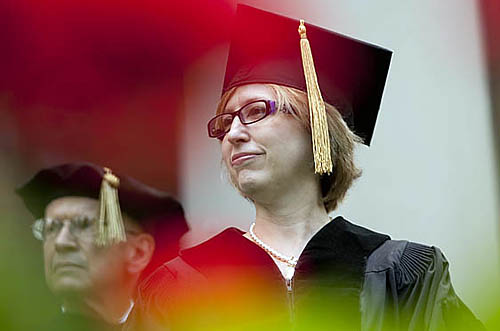Address by Teresa K. Woodruff

Unedited transcript, subject to change and correction, of Commencement 2010 remarks by Teresa Woodruff, who received the honorary degree Doctor of Science.
My co-honorary degree recipients and I represent the kinds of people that you can become, with stories of accomplishments, challenges, opportunities, perseverance, optimism and sometimes luck that are the ingredients of the future that each of you will face.
I look forward to the world that you will create after you leave Bates and strike out on your own pathways of discovery. Congratulations to all of you.
I am a scientist and my field of study is reproductive science, and, in particular, providing fertility options for young people facing a sterilizing cancer treatment. This field provides perhaps a short parable that may be illustrative to each of you on this day, as you move into that great future that you will create.
Nearly 40 years ago, this nation set out on a mission to study cancer and develop new treatments that would diagnose the disease earlier, treat the cancer more aggressively, and ensure that a cancer diagnosis was not an immediate death sentence. The aggressive war on cancer has not resulted in a total cure but has resulted in over 10 million Americans alive today who had a cancer and survived their disease. There are likely many cancer survivors with us today.
Ten percent of cancer patients are younger than 45 years old and within the age range, like you, who are still planning or in fact building their families. The good news for these people is that there are new technologies that are providing options at the time of diagnosis to prevent sterility by protecting gametes before treatment. I’ve have the good fortune to be part of this new area of work and coined the term “oncofertility” to ensure that oncologists and fertility specialists both see themselves as parts of the solution to the problem.
The story of oncofertility is personalized medicine as its best; it is a story of hope and renewal, which is the expectation we all have of research and medicine.
To create this field, we require three ingredients, which I think can be used by each of us as we face the challenges of our collective future.
First, create your opportunities. There’s a great dialog in Toy Story II during which Woody asks Cowboy why he’s been left on the shelf for so many years. Cowboy replies with great sputtering, “Three words, Woody. Sputnik.” Forget the irony that Woody and Cowboy are, well, cowboys, and Sputnik is one word and at most two syllables. But what Cowboy was recounting is a worry that we sometimes have: that things change so quickly that we will become irrelevant as soon as the next Buzz Lightyear or Class of 2011 makes the scene.
Opportunities exist even in an austere economic climate, and with your Bates education, the methods and decision tools that you’ve honed over the past four years, you are ready to create the modern-day Sputnik, the new way to communicate, new energy solutions or the next medical breakthrough.
Oncofertility was created to meet the urgent unmet need of 140,000 young people with cancer. We identified the need then worked tirelessly to create our opportunity. You will do the same.
Secondly, teams accelerate the pace of work. Humans are geared toward teamwork. Our families are our first experience with teamwork, and many of you are here today with your original team. The same will be true as you forge the path ahead of you. In our field we’ve created a team of basic and clinical scientists, oncologist, bioethicists, legal experts, communications scientists, as well as patient advocated and the patients themselves. By engaging all of the disciplines, we increase the pace and quality of our work, and ensure that the technology is developed in service of the people who will use it.
Even the most entrepreneurial of you will do better if you create a strong team at home and at work.
Finally, maintain your optimism as you solve seemingly intractable problems. Cancer in young people sounds like a very difficult topic to be optimistic about. Similarly, today’s world provides headlines that can challenge our resolve and hopefulness. In our new field, the news for cancer patients is better than ever. They are surviving their disease, and reproductive science and medicine is keeping up with their fertility needs. When oncologists and fertility scientists work together, patient needs are meet and can change a devastating diagnosis into life-affirming interventions.
You must meet the challenges you face, from within and from without, with determination and optimism. As Bates graduates, you are equipped to tackle the seemingly intractable problems of our day. We are all counting on you to become the thought leaders and doers of the 21st century. So, create opportunities, use your team, and leverage your optimism, as you leave this place as graduates who will lead our world to a better place. Congratulations to the faculty and parents who have guided you, and congratulations to the Class of 2010. You have a world of possibilities awaiting you.